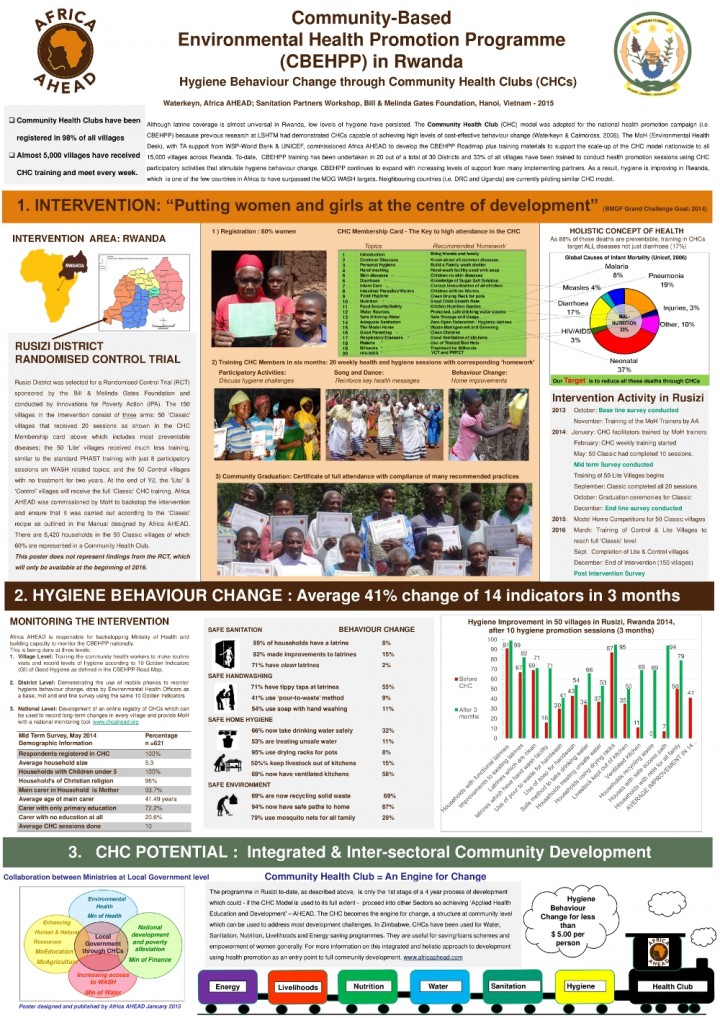Community hygiene clubs - Community Based Environmental Health Promotion Programme - Various documents on results from research grant
Waterkeyn, J., Waterkeyn, A. (2015)

Published in: 2015
Publisher:
Rwanda Ministry of Health, Africa AHEAD
Author:
Waterkeyn, J., Waterkeyn, A.
Uploaded by:
danijela milosevic
Partner profile:
Africa AHEAD
8782 Views
162 Downloads
Location of library entry
Content - Summary
This library entry contains background documents for a grant that Dr. Fidel Ngabo and Joseph Katabarwa are leading (together with Juliet Waterkeyn) and which is funded by the Bill and Melinda Gates Foundation (further information is also available on the SuSanA discussion forum, see link below).
Name of lead organization: Rwanda Ministry of Health / Africa AHEAD
Short description of the project:
The Ministry of Health (MoH) in Rwanda is currently implementing the Community-Based Environmental Health Promotion Programme (CBEHPP) which is in the process of establish Community Hygiene/Health Clubs (CHCs) in all 15,000 villages across Rwanda. The CHC model, as originally developed in Zimbabwe by Africa AHEAD (AA) in 1995, has in-built monitoring systems and tools . Although the CHC methodology has been adopted in a number of countries in rural and urban settings across East , West and Southern Africa over the past few years, Rwanda is the first country to be rapidly scaling up the model nation-wide. To date over 90% of the 15,000 villages in Rwanda have registered CHCs and over 5,000 have trained community members. By 2016, over nine million people (about 80% of the population) should benefit from CHCs if the programme is implemented as intended.
Since 2008, Arica AHEAD consultants have supported MoH to develop the CBEHPP Road Map (through WSP, 2008-2011) and the CHC Training Manuals (through UNICEF 2010-2011). It is now proposed that a practical monitoring system be established at village level in order to track hygiene behaviour change as the CHCs are established across the country. Africa AHEAD has been requested to assist in setting up monitoring procedures that will enable operational standards to be identified and demonstrated for the benefit of all CBEHPP implementing partners. A web-based ‘mobile research platform’ has been introduced to enable easy ‘real-time’ data collection and analysis using mobile phones, so building capacity for evidence-based policy-making within the MoH to ensure this national programme is rolled out at scale and implemented as cost effectively as possible.
Rusizi district in Western Province of Rwanda was selected to demonstrate the ‘Classic’ CHC Model. Within three years, 150 CHCs will have completed health and hygiene training that will benefit 15,000 direct CHC members (average of 100 members per Club) and with an estimated 75,000 direct beneficiaries (5 family members on average per household) with significantly improved hygiene facilities and behavioral practices in the home. Specific standards for the ‘Classic CHC’ will be established in order to provide a bench-mark for the national CBEHPP. In Year 1, a sample of 50 ‘Classic’ CHCs and 50 villages with a minimal ‘Light’ version of the CHC methodology was selected randomly, to be compared in Year 3 with 50 Control villages which will by then have received no treatment (i.e. neither exposure to the CHC nor training in health and hygiene). Monitoring the CHC model over three years will determine precisely how hygiene behavior can be improved to reduce the national disease burden in Rwanda and similar countries. Rusizi District will also be used for an in-depth evaluation study of health impact of the CHC approach. It will provide the first independent rigorous research of the CHC approach and will therefore be an important contribution to the international effort to identify the most cost-effective method to achieve sustainable and replicable hygiene behavior change at scale.
Goal:
To monitor the national Community-Based Environmental Health Promotion Programme (CBEHPP) and achieve cost-effective and sustainable hygiene behaviour change through implementation of the holistic and integrated CHC model to prevent common diseases.
+++++++++++
Documents available for download below:
1 - Poster about this project at BMGF grantees' Meeting in Hanoi (January 2015)
Bibliographic information
Waterkeyn, J., Waterkeyn, A. (2015). Community hygiene clubs - Community Based Environmental Health Promotion Programme - Various documents on results from research grant. Rwanda Ministry of Health, Africa AHEAD
Filter tags
Behaviour change (WG13) English Practitioners Rural Sub-Saharan Africa Sustainable WASH in institutions and gender equality (WG7)















